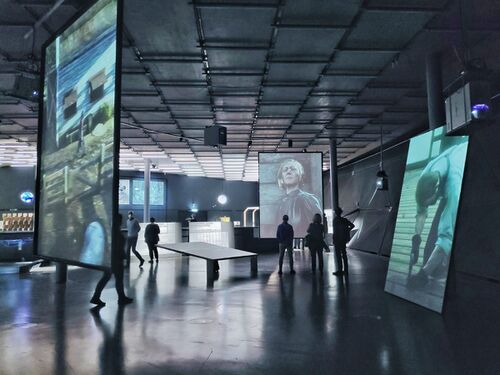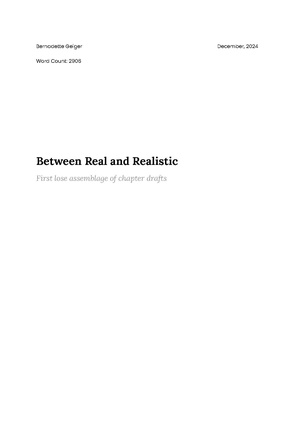User:Berna Bereit Master Thesis: Difference between revisions
Berna Bereit (talk | contribs) |
Berna Bereit (talk | contribs) |
||
| (One intermediate revision by the same user not shown) | |||
| Line 124: | Line 124: | ||
== Chapter Outline == | == Chapter Outline == | ||
[[User:Berna Bereit Master Thesis Chapter Outline]] | [[User:Berna Bereit Master Thesis Chapter Outline]] | ||
== First lose assemblage of chapter drafts == | |||
Find the pdf here: | |||
[[File:241212 MA24-25 first-draft-chapters BernadetteGeiger.pdf|left|thumb|424x424px]] | |||
Latest revision as of 14:55, 13 December 2024
Notes
Context
- find a context for your thesis
- try to get out of the XPUB bubble
- who are people/collectives/institutions that are working on a similar topic
Format of Thesis
- project proposal (1500 words)
- thesis (7000 - 8000 words)
It can be ...
1) a report on your research and practice.
2) an analytical essay exploring related artistic, theoretical, historical and critical issues and practices that inform your practice,
3) the presentation of a text as a body of creative written work
4) a combination of options 1), 2) or 3)
Important questions for you to ask yourself
What mode of address do you want to assume?
How do you want your text to speak to the reader? (this dictates the form: essayistic, academic, narrative, non-linear, script, diary, field report)
Note: you can use different modes of address for different sections.
Criteria
1) Intelligibly express your ideas, thoughts and reflections in written English.
2) Articulare in writing a clear direction of your graduate project by being able to identify complex and coherent questions, concepts and appropoiate forms.
3) Clearly strucure and analyse an argument.
4) Use relevant source material and references.
5) Research texts and practices and reflect upon them analytically.
6) Synthesize different forms o f knowledge in a coherent, imaginative and distinctive way.
7) Position one's own views within a broader context.
8) Recognize and perform the appropirate mode of address within a given context.
9) Engage in active dialogue about your written work with others.
Havard referencing
- References are places within the text, not in footnotes
- Within the text, you need to reference when you:
- quote someone's work directly: "I reference therefore I am" (Doe, 2024, p.404)
- indirectly refer or build upon their work: The work of Doe demonstrates that referencing is an existential matter fo some writers (2024).
- When quoting someone from another persons's work go this way: (Doe quoted in Andersen, 2024, p.502).
- If there are two publications by the same author in the same year, use a letter after the year to differentiate (Doe, 2024a; Doe, 2024b)
- At the end of your essay, include the full reference. Each type of publication (video, interview, journal, paper, book, book chapter, etc.) has slightly different bits of info that need to be mentioned. For an overview of all possible types of sources, see https://library.lsbu.ac.uk/harvard/home (link at bottom of 'guide to essay writing')
- Example: Author, Initials., Year. Title of book. Edition. (only include this if not the first edition) Place of publication (this must be a town or city, not a country): Publisher.
Project That May (Or May Not) Be Made
What?
Topic: The representation of labor unions in video games
The project deals with the analysis of how labor unions and movements are portrayed in video games. This includes examining narrative strands, game mechanics and aesthetic elements that focus on class struggles and collective organizations in games such as Red Dead Redemption 2 and Bioshock Infinite. It will also address the issue of labor unionism within the games industry itself, particularly in relation to the working conditions of developers.
Why?
This topic is socially and culturally significant, as video games are a growing medium that is increasingly used as a platform for social and political discourse. The representation of labor unions and movements in games not only reflects historical and contemporary conflicts, but also provides a framework to address system criticism, solidarity and collective action. The analysis helps to understand how the visual and narrative design of games affects the perception of social realities and to what extent these representations can stimulate reflection on workers' struggles.
Workflow
1. Theoretical research:
- Examination of academic literature on trade unions in the fields of social theory, cultural studies and game studies.
- Analysis of the history of trade unions and labor movements in art, film and literature as a context for representation in video games.
2. Game analysis:
- Selection of relevant games (Red Dead Redemption 2, Bioshock Infinite, among others) that address labor unions and workers' struggles.
- Examination of the narrative and mechanical implementation of trade union themes in these games.
- Analyze the visual aesthetics and design of these games in relation to labor movements and class struggles.
3. Relation to game development:
- Research union movements within the game development industry.
- Interviews or case studies of current movements that address the working conditions of developers and crunch culture.
4. Interpretation:
- Synthesis of findings from theoretical research and game analysis.
- Discussion of how games as a medium reflect social realities and which narrative and aesthetic decisions lead to a critical examination of labor struggles.
5. Installation
- Based on the research, the results are to be translated into an installation
- Potentially, a screen installation with examples and accompanying information or the creation of a game in which mechanisms are visualized and made playable are possible.
Timetable
Relation to previous practice
This research builds on existing work in game studies, social theory and art studies that examine video games as a medium of social reflection. Previous studies have looked at the representation of women, political protests and social movements in video games, but the specific examination of trade unions is a relatively unexplored field. The project builds on previous work on collective movements and their representation in digital media and expands the discourse to include the question of how class struggles and labor movements are visually and narratively represented in games.
Choices made
For the analysis, games were selected that have already attracted attention in research for their thematic depth (Red Dead Redemption 2, Bioshock Infinite), as they offer explicit narratives about workers' struggles and trade unions. The combination of theoretical literature review and the analysis of game mechanics and aesthetic choices allows for the development of a comprehensive perspective on the representation of trade unions in video games. The consideration of working conditions in the games industry itself adds an additional, practice-relevant dimension to the project.
Sources & Quotes
"I wonder if it is not time for game design to start being a spatial exercise tool through which we, protesters, can practice and acquire urban tactics that stand against the state’s oppression?" [Bashady, Hamza (2022). A Passive Mob: How Video Games Silence Dissent. Online. URL: https://futuress.org/stories/a-passive-mob]
"Club Stahlbad takes a stab at the dysfunctionality of the established spaces of entertainment, where “fun” is obligatory as a ritualized counterpart to “labor” - subordinating both work and “free time” to the logics of capital accumulation." [Total Refusal (2023). Club Stahlbad. Online. URL: https://totalrefusal.com/home/club-stahlbad]
"NPCs are digital Sisyphus machines that have no perspective of breaking out of their activity loops. In the moments when the algorithm shows inconsistencies, the NPCs break out of the logic of total normality, and appear touchingly human." [Total Refusal (2022). Hardly Working. Online. URL: https://totalrefusal.com/home/hardly-working]
Project Proposal Outline
User:Berna Bereit Master Thesis Project Proposal
Thesis Outline
User:Berna Bereit Master Thesis Outline
Public Moment
User:Berna Bereit Master Thesis Public Moment
Chapter Outline
User:Berna Bereit Master Thesis Chapter Outline
First lose assemblage of chapter drafts
Find the pdf here:


